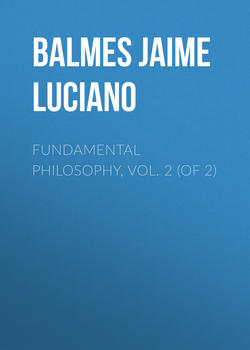Читать книгу Fundamental Philosophy, Vol. 2 (of 2) - Balmes Jaime Luciano - Страница 20
BOOK FOURTH.
ON IDEAS
CHAPTER XX.
INTERMEDIATE REPRESENTATIONS BETWEEN SENSIBLE INTUITION AND THE INTELLECTUAL ACT
Оглавление125. The question now occurs, whether the understanding, in order to perceive the geometrical relations offered in sensible intuition, does or does not need some intermediate representations which bring it into contact with the sensible order?10 Such a necessity would, at first sight, seem to exist, since, as the understanding is a non-sensible faculty, sensible elements cannot be its immediate object. But on maturer examination, it seems more probable that there is no necessity of any thing intermediate, except some sign to connect the sensible elements, and to show the point where they must unite, and the conditions to which they are subject. As this sign may, however, be a word, or something else, susceptible of a sensible representation, its mediation will not at all solve the difficulty; since the question will always recur: How is the understanding placed in communication with the sensible sign?
This difficulty arises from the faculty of the soul being considered, not only as distinct, but also, as separate, and as exercising each one of its faculties in its own peculiar and exclusive sphere, entirely isolated from that of all others. This mode of considering the faculties of the soul, though favorable to the classification of their operations, does not accord with the teachings of experience.
It cannot be denied that we observe within ourselves, affections and operations, very unlike each other, and arising from distinct objects, and producing very different results. This has led to a distinction of faculties, and in some degree, to a separation of their functions, so as to prevent them from mixing together and being confounded. But there can be no doubt that all the affections and operations of the soul are, as consciousness reveals, bound to a common centre. Whatever becomes of the distinction of the faculties among themselves, it is very certain, as consciousness tells us, that it is one and the same being that thinks, feels, desires, acts, or suffers: it is certain that this same consciousness reveals to us the intimate communication of all the operations of the soul. We instantaneously reflect upon the impression received; we instantaneously experience an agreeable or disagreeable sensation in consequence of a reflection which occurs to us: we reflect upon the will; we seek or repudiate the object of our thought; there is, so to speak, within us a boiling spring of phenomena of different kinds, all interlinked, modified, produced, reproduced, and mutually influenced by each other in their incessant communication. We are conscious of all these; we encounter them all in one common field, which is the subject that experiences them. What necessity, then, is there to imagine intermediate beings in order to bring the faculties of the soul into communication with each other? Why may it not with its activity, called understanding, occupy itself immediately with sensible representations and affections and with all that is in its consciousness? Supposing this consciousness in its indivisible unity to comprise all the variety of internal phenomena, it does not therefore follow that the intellectual activity of the soul cannot be referred to whatever it contains of active or receptive, without its being necessary to imagine species to serve as courtiers between the faculties, to announce to one what has taken place in the other.
126. The acting intellect of the Aristotelians, admissible in sound philosophy so far as it denotes an activity of the mind applied to sensible representations, does not seem alike admissible, if it be supposed to be the producer of new representations distinct from the intellectual act itself. The understanding is all activity; the receptivity of the soul has nothing to do with it, but to proportion its materials; and the conceptions elaborated in presence of these materials, seem to be nothing else than the exercise of this same activity, subject on the one hand to the conditions required by the thing understood, and subordinated on the other hand to the general conditions of every intelligence.
127. I do not mean to say that the intellectual act does not refer to any object. I replace the idea by other acts of the soul, or by affections or representations of some kind or other, whether active or passive. This being so, if I am asked, for example, what is the immediate object of the intellectual act perceiving of determinate sensible intuition, I reply that it is the intuition itself. If the difficulty of explaining the union of such different things be urged, I answer: first, that this union exists in the unity of consciousness, as the internal sense attests: second, that the same difficulty militates against those who pretend that the understanding elaborates an intelligible species, which it takes from the sensible intuition; and how, I may ask, does the understanding place itself in contact with this intuition when it would elaborate its intelligible species. If this immediate contact be impossible in the one case, it will be equally so in the other; and if they concede it to be possible in their own case, they cannot deny it to be possible in ours also.
When the understanding refers to no determinate intuition, but only to sensible intuitions in general, its immediate object is their possibility also in general, subject to the conditions of the object considered in general, and to those of every intelligence; among which, the principle of contradiction holds a primary place.
10
See Chap. VI.
